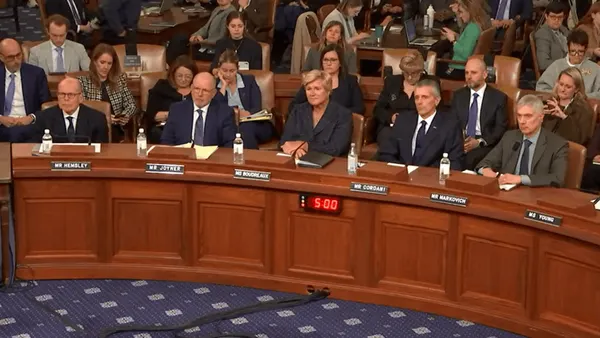Dive Brief:
- Aetna and Optum have finalized an almost $8.4 million class settlement over allegations that the two companies used so-called “dummy codes” to hide administrative expenses in patients’ medical charges, driving up their out-of-pocket costs.
- The settlement approved Thursday by the Western District Court of North Carolina requires Aetna to pay $4.6 million and Optum to pay $200,000 into a settlement fund covering patients and health plans for the overpayments. Aetna has also agreed to pay almost $3.6 million in attorneys’ fees
- The settlement brings an almost decade-long case to a close.
Dive Insight:
Sandra Peters, a retiree with Aetna health insurance, filed the complaint in 2015 alleging that Aetna and Optum Health, Optum’s care delivery unit, failed to uphold their fiduciary duties under the Employee Retirement Income Security Act, or ERISA, which oversees private-sector employee benefit plans.
Peters, the lead plaintiff in a class that’s grown to cover more than 250,000 members, sued after seeing her out-of-pocket costs for chiropractic care and physical therapy dramatically increase. Optum Health is named in the suit because it oversaw Aetna’s network of such providers.
Emails between Aetna and Optum Health executives later showed that the companies had agreed to add an extra service code to patients’ bills to cover administrative costs. Aetna also admitted to North Carolina regulators that it had directed Optum Health to submit codes so that the contractor could be reimbursed for its services, according to court documents.
Still, Aetna maintained that total costs were lower than they would have been if the insurer had not contracted with Optum. The district court ruled in favor of Aetna and Optum Health in 2019.
But the 4th Circuit Court of Appeals overturned that decision two years later, sending it back to the lower court. The Supreme Court also declined to hear the case in 2022.
In November, after one year of negotiations, the parties agreed to a settlement that the court preliminarily approved in March, despite some cold feet from Optum. Coming to an agreement on terms and securing the judge’s final approval was the final hurdle before the case could be closed.
Employer-sponsored insurance is the primary form of health coverage in the U.S., covering almost 180 million Americans. The majority of such workers are covered by self-funded plans, meaning that employers, not health insurance companies, take on the financial risk of paying claims. Still, employers typically contract with health insurers to administer the coverage.
But despite ERISA requirements that the payers act “solely in the interest of the participants and beneficiaries” of the plan, cases frequently come to light of practices like those outlined in Peters’ suit, which may be driving up spending for employers and their members.
Aetna’s parent company CVS declined to comment for this story. Optum’s parent company UnitedHealth did not respond to a request for comment.













